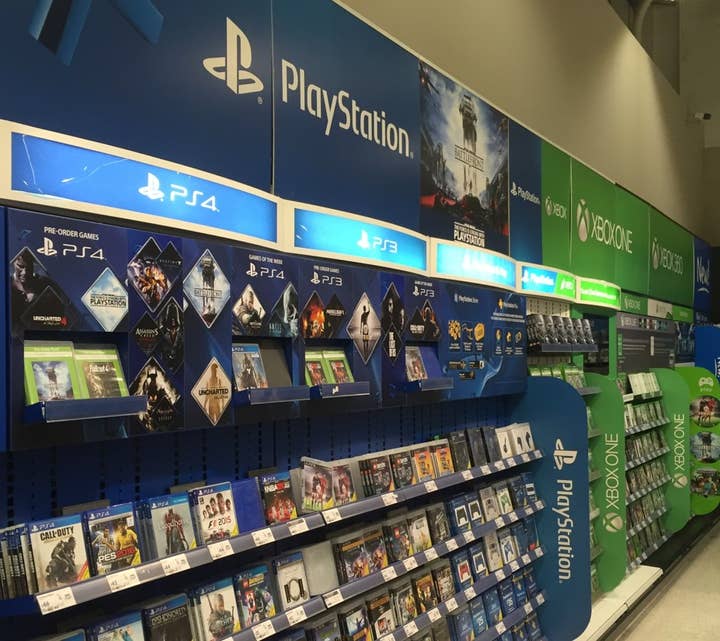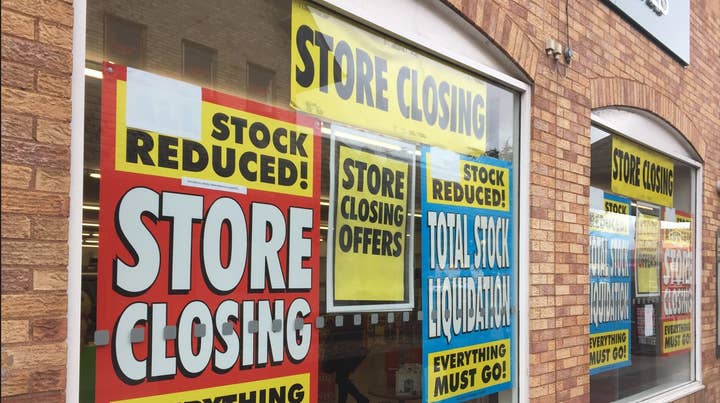Let's not rush the death of physical video games | Opinion
It's been a bad few weeks for physical games retail, but it's not over yet
There's a regular joke in our household whenever anyone mentions eggs.
It stems from a UK TV ad from 12 years ago. In it, a man comes back from the shop and his partner says: "Good, you're back with the eggs." He looks mortified and replies: "Oh, you said eggs." The partner (played by Aisling Bea, for fans of British comedy) looks confused: "Yeah." He opens his shopping bag to reveal a video game. "I thought you said Call of Duty: Modern Warfare 3."
To this day, whenever anyone in our house talks about eating eggs, someone will reply: Why would you want to eat Call of Duty: Modern Warfare 3? We are nothing if not hilarious.
The ad in question was not by Activision. It was created by the UK supermarket chain Tesco. Back then Tesco was a giant in the world of video games retail. With thousands of shops across the UK that were open 24 hours a day, it made sure it was the first to sell the latest big release. In 2009, I visited the firm's HQ in Welwyn Garden City, and the head of entertainment proudly told me the company wanted to be the second biggest retailer of video games in the country behind GAME.
Tesco had the finances, store portfolio, and buying power to get the best deals from suppliers. Because it was a business built on selling food, and wasn't reliant on games to make a profit, it would often cut prices to extremely low levels. On more than one occasion, it was cheaper for rival retailers to buy their games from Tesco than it was from official distributors. Tesco would 'loss lead' (where they lost money on the games they sold) to win over customers. Indie shops didn't stand a chance.
But Tesco had one competitor it couldn't beat: itself. As physical game sales started to fall, other departments in Tesco, such as clothing, technology, and toys, were asking: 'Why can't we have those shelves?' And, of course, they could. Tesco games aisles went the same way as its CD and DVD offerings… The space on shelves was cut, the smaller stores removed them entirely, and now they're about to disappear from all 2,800 stores.
Tesco is only the latest in a string of troubling headlines around the physical games business. GameStop reported more losses and changed its management, and – via a largely missed notice on its Instagram page – closed all its 35 stores in Ireland.
The European data for the first half of the year showed that physical game sales are down 9% year-on-year, despite the launch of some major console games like The Legend of Zelda: Tears of the Kingdom and Hogwarts Legacy.
The European data for the first half of the year showed that physical game sales are down 9% year-on-year
Meanwhile, our interview with GAME last month was candid about the direction of travel, with GAME boss Nick Arran explaining the retailer's current push into toys.
"Gaming is our core business and we will be the last man standing selling physical video games," he said. "But we need to be realistic. We have a business to run and the expectation is this will decline."
For a long time there was the argument that you cannot download a console, and indeed there is still a need for somewhere to sell hardware and controllers. But increasingly the platform holders are going direct, with Sony initially releasing some of its recent products – namely PSVR 2 and the Edge controller – exclusively via its own online store.
It feels like the days of games being found in your local shopping centre or High Street are coming to an end. But it isn't over yet. Across Europe for the first half of this year, 29 million PC and console games were sold. It may be a declining market, but it's still a big one.
And things vary by franchise and platform. PC is practically 100% digital, while Xbox is getting there, driven in part by the popularity of its digital-only Series S console. But things are different with PlayStation and Nintendo. In 2022 in Europe, GSD data showed that when it came to new Nintendo Switch games, over 80% of sales came via physical stores (this is based on third party titles, as Nintendo does not share first party digital data).
We revealed this week that the majority of Final Fantasy 16 sales in Europe, which is a PS5 exclusive, came via physical games retailers (although it was close).
Of course, the gulf between digital and physical is only getting wider, but the video games industry isn't ready for a complete switch to digital. Tesco exiting the video games industry is troubling. It is the biggest chain of shops in the UK. It is present in every major town and all the minor ones, too. And for some physical games, it was still commanding a market share well into the double digits. For someone like Nintendo, the loss of a retailer like Tesco is a blow to its business.

But I also think it's a blow to the industry overall. We're often eager to point out that video games are bigger than movies and music. But outside of the fancy revenue figure, are they really? TV, movies, and music are ubiquitous, but there are still generations and demographics of people that don't engage with video games, at least outside of mobile.
PC and console games remain the playground of a relatively small number of people. And losing an avenue, like Tesco, to speak with potential new customers is a disappointment.
That 2011 Tesco ad is almost a relic of a bygone era. A time when a mainstream retailer would take out a prime time TV advertising slot to promote an Xbox 360 game. A game that would then receive hundreds of midnight openings and be plastered across the national newspapers.
Today, games publishers know that TV advertising isn't as effective as directly engaging with its community. They know that physical retailers don't deliver the same return as digital ones. By cutting these things out, publishers can have a more direct relationship with their customers, respond to feedback faster, they can manage the product lifecycle more effectively, they can directly sell DLC, they can overcome the challenges of pre-owned… In other words, they have more control and can make more money.
So digital distribution is clearly a positive thing for the games business. Yet I feel in our rush to get there, we are at risk of leaving behind potential customers we wouldn’t otherwise have.
Coincidentally, a new Call of Duty: Modern Warfare 3 is expected to launch this year. And I have little doubt it'll be far more financially successful than the one that launched in 2011. But I do have to wonder if as many people will know it's even there.


